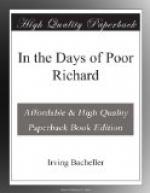“I love old England,” it said, “because it is your home and because it was the home of my fathers. But I am sure it is not old England which made the laws we hate and sent soldiers to Boston. Is it not another England which the King and his ministers invented? I ask you to be true to old England which, my father has told me, stood for justice and human rights.
“But after all, what has politics to do with you and me as a pair of human beings? Our love is a thing above that. The acts of the King or my fellow countrymen can not affect my love for you, and to know that you are of the same mind holds me above despair. I would think it a great hardship if either King or colony had the power to put a tax on you—a tax which demanded my principles. Can not your father differ with me in politics—although when you were here I made sure that he agreed with us—and keep his faith in me as a gentleman? I can not believe that he would like me if I had a character so small and so easily shifted about that I would change it to please him. I am sure, too, that if there is anything in me you love, it is my character. Therefore, if I were to change it I should lose your love and his respect also. Is that not true?”
This was part of the letter which Jack had written.
“My boy, it is a good letter and they will have to like you the better for it,” said John Irons.
Old Solomon Binkus was often at the Irons home those days. He had gone back in the bush, since the war ended, and, that winter, his traps were on many streams and ponds between Albany and Lake Champlain. He came down over the hills for a night with his friends when he reached the southern end of his beat. It was probably because the boy had loved the tales of the trapper and the trapper had found in the boy something which his life had missed, that an affection began to grow up between them. Solomon was a childless widower.
“My wife! I tell ye, sir, she had the eyes an’ feet o’ the young doe an’ her cheeks were like the wild, red rose,” the scout was wont to say on occasion. “I orto have knowed better. Yes, sir, I orto. We lived way back in the bush an’ the child come ’fore we ’spected it one night. I done what I could but suthin’ went wrong. They tuk the high trail, both on ’em. I rigged up a sled an’ drawed their poor remains into a settlement. That were a hard walk—you hear to me. No, sir, I couldn’t never marry no other womern—not if she was a queen covered with dimon’s—never. I ’member her so. Some folks it’s easy to fergit an’ some it ain’t. That’s the way o’ it.”
Mr. and Mrs. Irons respected the scout, pitying his lonely plight and loving his cheerful company. He never spoke of his troubles unless some thoughtless person had put him to it.
2
That winter the Irons family and Solomon Binkus went often to the meetings of the Sons of Liberty. One purpose of this organization was to induce people to manufacture their own necessities and thus avoid buying the products of Great Britain. Factories were busy making looms and spinning-wheels; skilled men and women taught the arts of spinning, weaving and tailoring. The slogan “Home Made or Nothing,” traveled far and wide.




